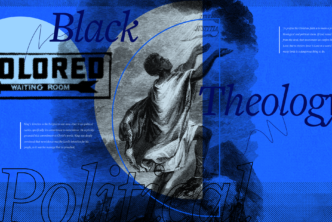One cannot explore the emergence of the Protestant Reformation without talking about the contribution of Renaissance humanism—what I like to call “the tie that binds.”
As one scholar declared famously, “No humanism, no Reformation.”
Today, scholars concede that humanism alone did not instigate the Protestant Reformation. Nevertheless, there is no denying that it played a significant role in the emergence and expansion of the Protestant Reformation throughout Europe. Erasmus’ publication of the first Greek New Testament in 1516 is a milestone moment for humanism and for the history of the Reformation that cannot be overlooked.
Defining Renaissance humanism
So what was Renaissance humanism, and how did it factor into the origin and diffusion of the Protestant Reformation?
The Renaissance was a period from the fifteenth through the sixteenth centuries, best characterized by the intellectual movement known as humanism. Humanism was an educational movement. It sought to recover classical language and literature. Humanists worked to bring rebirth to the present through the retrieval of the ancient past.
In this way, humanists regarded the Renaissance in opposition to the medieval period, a period they successfully popularized as the Dark Ages. In truth, there was enduring continuity between the medieval period and the Renaissance; no transition is ever wholly new. Nevertheless, humanism was distinct in that its appreciation for the Roman past led to an active recovery of that past for the utility of the present.
The emergence of Renaissance humanism
When tracing its origins, humanism emerged in Italy and spread across the Alps. For over a century, scholars have regarded the Italian poet, Francis Petrarch, as the “father of humanism.” Petrarch’s life certainly illustrates the humanist mission of retrieving texts of classical and Christian antiquity and evaluating their authenticity. His discovery of various works by Cicero, for example, was influential in paving the way for other manuscript discoveries that would form humanist work profoundly. The collections that emerged from these textual searches would later serve as the foundation of some of the greatest libraries in Italy.
The objectives of Renaissance humanism
Ad Fontes
Importantly, this practice reflects humanism’s methodological priority of returning to the root or origin of a source in order to uncover the pure meaning. This concept is represented by the Latin phrase ad fontes or “to the sources,” “back to the fount.” The humanist method was, at its core, inherently critical of the Middle Ages because it advocated, in a sense, skipping over an entire period of scholarship in favor of earlier voices as models for contemporary society.
The desire to return to the purity of the sources had two important effects for the church.
First and foremost, it led to an interest in the original languages of the Bible—Greek and Hebrew. The Latin West’s ignorance of the Greek language stretches all the way back to the fifth century, when the West began to exclusively read the Greek Church fathers by way of Latin translations. Famously, Gregory the Great (Pope Gregory I) was sent as a legate to Constantinople in the sixth century, though completely ignorant of the Greek language. Perhaps it’s no surprise then that language differences would have a divisive impact on the relationship between the East and the West, culminating eventually in mutual excommunication by the eleventh century, though this was by no means the last word in that relational dynamic.
The rediscovery of Greek opened the door for reading the NT in the original language. Meanwhile, a broader sweep of the Greek classics became available and a new interest and appreciation for the Greek fathers of the Church developed as well. As the Byzantine Empire faced imminent demise during the fifteenth century due to the growing strength of the Ottoman Turks, a flood of Greek manuscripts made their way to Italy, particularly after the meeting of the Council of Florence, and a flurry of translation soon followed.
A whole new world of knowledge was opening up to the western world as it began to move away from Aristotelian thinking on a variety of fronts.
Importantly, the West also experienced an expansion of Hebrew learning as well. Though Hebrew was better known in the West than Greek, due to the presence of Jewish communities, Christendom was still largely ignorant of the language. It has been estimated that from the year 500–1500, no more than a few dozen Christians could read Hebrew. Yet, extraordinary shifts happened with the dawn of the sixteenth century. By 1550, a student could study Hebrew at every major university in Western Europe and Germany. The most significant contributor to the advancement of Hebrew in the Christian world early on was Johann Reuchlin. By discovering a new appreciation for the value of ancient languages, the Bible and Christian antiquity were encountered in new and transformative ways within the Western Church and society.
Attack on scholasticism
The emphasis on language gives a window into understanding how humanism was, in itself, a kind of educational revolution. At its heart, humanism was critical of medieval scholasticism for its style of learning as much as its method of pursuing knowledge. Dialectical reasoning—wherein questions were posed and answered—had defined scholastic education, but humanists regarded this approach as decidedly speculative and even irrelevant. With their overemphasis on logic and philosophy, scholasticism seemed detached from reality and from how knowledge could actually be beneficial.
Consequently, humanists sought to eclipse medieval education with a classical education that emphasized the following areas: first of all, language, the study of Greek and Hebrew; secondly, grammar, represented by philology; thirdly, hermeneutics, namely the art of interpreting and reading texts; and finally, rhetoric, the art of persuasive and eloquent oratory. Each of these educational values would have an impact on the Church from preaching to reading the Bible. Meanwhile, the printing press was critical in expanding the reach of humanist objectives.
***
Discover more about important moments before, during, and after the Reformation with Milestones of the Protestant Reformation, a Logos Mobile Ed course by Dr. Jennifer Powell McNutt.
Related articles
- How Luther Accidentally Sparked the Reformation
- John Wycliffe: The Morning Star of the Reformation
- Reformation Day: The Other Holiday on October 31
- Does the Protestant Reformation Still Matter? (Interview)
Related resources
- Luther’s Works (55 vols.)
- Milestones of the Protestant Reformation
- Reformation Theology: A Systematic Summary




